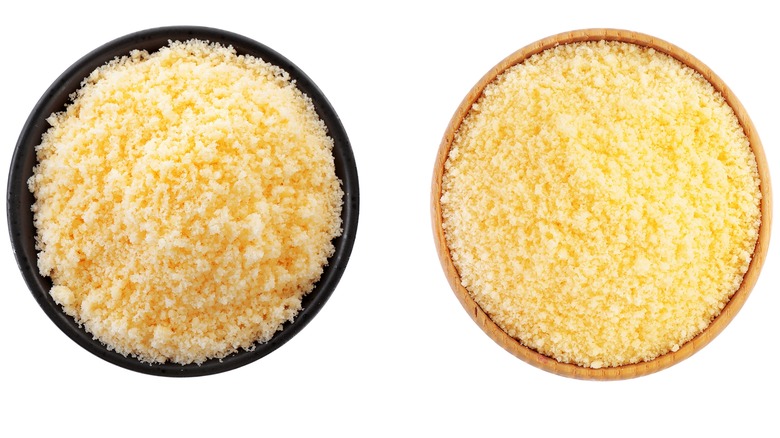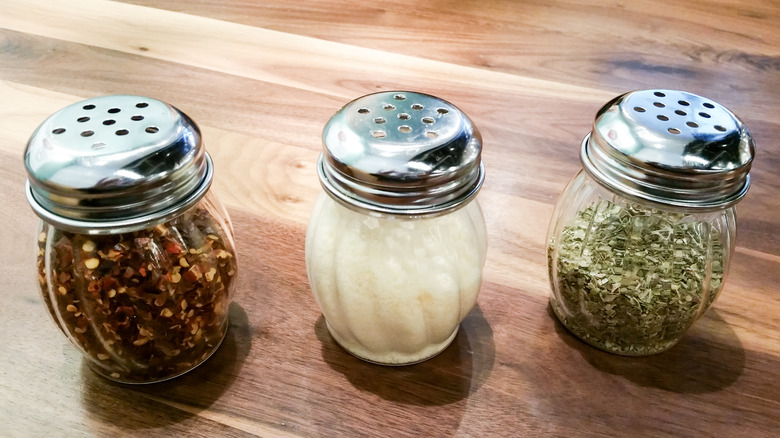The Controversial Ingredient Alton Brown Can't Get Enough Of
Few celebrity chefs have as much eccentric taste as Alton Brown. Throughout his career, the former host of "Good Eats" and the prolific author of several cookbooks has shared his love for a variety of divisive ingredient combinations, such as sardine avocado sandwiches and using sour cream to make a velvety cheesecake. However, none might be as controversial as the time Brown admitted that he had a soft spot for shelf-stable grated Parmesan (ironically, the one pantry item Ina Garten even said she could not get behind).
On Instagram, Brown shared an image of two Kraft grated Parmesan packets, writing in the caption that he would "snort this stuff like the cellulose powder stepped on cow candy that it is." Many of his followers expressed gratitude for his honesty, and reminisced over the various recipes they loved to add this ingredient to, while others did not share the love for the cheese. Brown's fondness for grated Parmesan is reflected in many of his recipes, including his take on cacio e pepe and eggplant pasta, where he uses the ingredient as a finishing touch. But, not everyone shares his fondness for it.
What exactly is shelf-stable grated Parmesan?
Generally speaking, a bottle of shelf-stable Parmesan largely consists of finely grated aged cheese that comes with preservatives such as potassium sorbate, which the U.S. Department of Agriculture deems as safe to consume. Many people don't share Alton Brown's love of this powdery ingredient because it's not a true substitute for Parmigiano-Reggiano, which is an authentic product from a particular region of Italy and has a much stronger flavor.
Most shelf-stable Parmesan options are actually made from lower-grade cheeses that are similar in flavor and texture to their Italian counterparts, which is why they are typically sold for a lot less at most grocery stores. And many home cooks fondly prefer this product for its convenience and lengthy shelf-life — though others won't ever use the substitute.
Part of the reason why so many chefs are divided over bottled grated Parmesan is because there's a common misconception that it contains wood pulp. This rumor arose sometime around 2016, when the U.S. Food and Drug Administration sued the company Castle Cheese, Inc. for cutting its products with excessive amounts of cellulose. This is an edible (although non-digestible) plant fiber that can be extracted from wood pulp, but not always.
Around that time in 2016, some reporting on the incident incorrectly claimed that pre-grated Parmesan items contained sawdust and other inedible additives, which wasn't the case. Even if that cellulose did come from wood pulp, which is highly unlikely, it's a completely harmless additive that has no taste and can even prevent cheese from clumping.
Buying and cooking with the best grated Parmesan
Regardless of how — or even if — you use shelf-stable grated Parmesan cheese, it's important to look for the best option at the store. Generally speaking, you want to select brands that have a prominent cheese flavor, are not overtly salty, and come from trustworthy manufacturers that put quality first. If you can, prioritize any products that don't have more than 4% cellulose. While it's a harmless additive, you want to make sure you're buying shelf-stable grated Parmesan that's mostly cheese — not plant fiber.
While many people primarily use grated Parmesan as a pizza and pasta topping, it actually has many more uses in the culinary world. Salads, meatballs, and even Mexican elotes are just a few of the many dishes that can benefit from a sprinkle of this savory ingredient. If you're looking for unique ways to implement pre-grated Parmesan into your cooking, take a cue from Alton Brown and use it to make oven-baked cheese crisps and mashed potatoes.
Otherwise, think of this powdery cheese as a general seasoning. Pizza and popcorn are excellent examples of this application, as they can benefit from the subtler flavor and powder-like texture of shelf-stable grated Parmesan, unlike the real stuff that has too much of a potent flavor.



